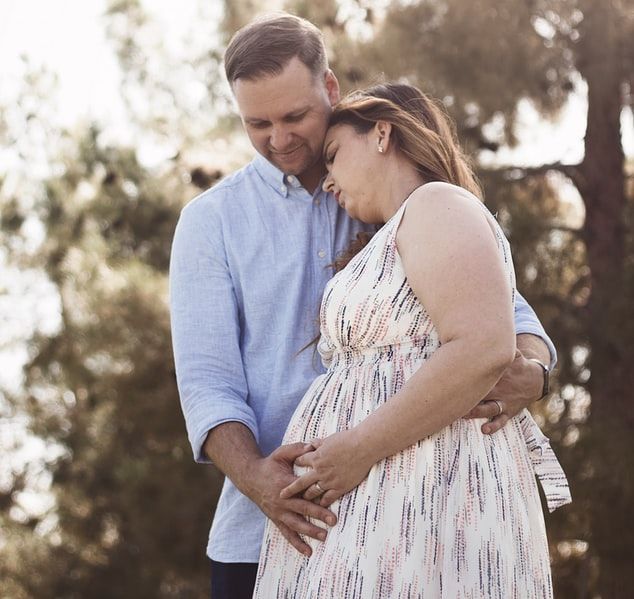Dizziness, Lightheadedness, and Fainting

Feelings of dizziness and lightheadedness are quite common during pregnancy and can be caused by dehydration, low blood pressure, blood volume changes, low blood sugar, illness, and nausea and vomiting of pregnancy, as well as many other causes not related to pregnancy.
Pregnancy is a very dangerous time to experience dizziness or faintness. These symptoms could lead to a falling event as women's center of gravity is altered; a fall could result in an emergency for both mother and baby.
Pregnant women currently experiencing dizziness should avoid any activity that could increase the risk of falling, tripping, or general instability.
As there are many possible reasons women can feel dizzy during pregnancy, women need to mention their symptoms to their HCP who can help identify a potential cause or rule out cardiovascular concerns.
Background
Pregnancy-related changes can cause an increase in feelings of dizziness or faintness for some women. Fortunately, the potential causes for these symptoms during pregnancy are mostly harmless. Women can also experience dizziness for reasons that are not related to pregnancy.
In general, dizzy spells may lead to fainting or falling in some women, which can be dangerous during pregnancy. Therefore, women need to inform their HCP anytime they experience dizziness in the event additional evaluation is necessary.
Causes
Hormonal changes in early pregnancy affect the cardiovascular system and can cause major blood pressure fluctuations, resulting in dizziness.
Some researchers report blood pressure drops significantly by 6 to 7 weeks of pregnancy, likely due to the increase in circulation to the fetus and placenta, and could be a cause of fatigue, exhaustion, and dizziness early in pregnancy. The largest decrease has been reported to occur between 16 and 29 weeks of pregnancy, with a return closer to normal near term.
Blood pressure can also significantly decrease during a hot bath or shower, which is why some women feel dizzy when standing up to get out of a bath. Women who enjoy hot baths should limit the amount of time they spend in the water, and ask for assistance when getting in and out of the tub or stepping out of the shower (read Heat Exposure for more detail on showers and baths).

This decrease in blood pressure can also affect how women feel when they quickly change positions. Women who lie on their backs or stand up too quickly after being in a certain position for an extended period can experience lightheadedness, dizziness, black spots in their vision, and nausea – known as orthostatic hypotension.
Blood volume is distributed differently relative to the position of the heart whether a person is supine or upright. For example, when an individual moves from a seated position to a standing position, blood must travel quickly up from the legs to the brain; when there is a delay in this process (such as during pregnancy), orthostatic hypotension results.
This problem may get worse as pregnancy progresses. Blood tends to pool in the legs and gets further obstructed from reaching the upper body as the uterus expands. These symptoms can be relieved if a woman moves or stands up slower, takes her time, or immediately sits/lies back down if symptoms are severe.

Drinking 300 to 500 ml of water can also mediate these episodes as water intake reduces heart rate and increases blood pressure. Dehydration is a common cause of dizziness in general, especially after exercising, exposure to hot weather, fever, or illness.
Women experiencing mild, moderate, or severe nausea and vomiting of pregnancy (NVP) in the first trimester may feel dizzy more often than women who are not experiencing NVP. NVP can also cause dehydration, weakness, fatigue, and electrolyte imbalances, especially if vomiting is present.
Low blood sugar (hypoglycemia) very commonly presents with dizziness, as well as shakiness, anxiety, hunger, and fatigue. Women can relieve and prevent these symptoms by eating balanced snacks and/or meals every 2 to 3 hours.
Pregnancy itself also results in an overall loss of balance, mostly in the third trimester which can be mistaken for dizziness.
Beginning in the second trimester, weight gain and a change of gravity increases toward the front. This new forward position can affect balance which normally deteriorates by the third trimester. A fall during pregnancy is estimated to cause an emergency in up to 40% of women, depending on stage of pregnancy.
Blockage of the eustachian tube also causes dizziness during pregnancy. The eustachian tube connects the middle ear (regulates balance) to the nose; increased fluid volume during pregnancy can block this tube (much like a cold) which can throw off balance perception, causing dizziness. Blockage of this tube is also a common cause of vertigo.
The most common causes of vertigo are migraine-related vertigo and benign positional paroxysmal vertigo (BPPV), a mechanical problem of the inner ear, which is not specific to pregnancy. BPPV is benign, comes on suddenly, is triggered by head or body movements, and presents with a false sense of spinning.
According to one study, prolonged bed rest may be another cause for BPPV in pregnant women. The use of bed rest is not supported by evidence. More information can be read here.
Action
Pregnant women currently experiencing dizziness should avoid any activity that could increase their risk of falling.
As there are many possible reasons women can feel dizzy during pregnancy, women need to mention their symptoms to their HCP who can help identify a potential cause.
Overall, pregnant women should:
Remain properly hydrated
Exercise carefully
Keep cool and avoid hot weather and prolonged heat exposure
Avoid lying flat on the back past the first trimester (read more)
Change positions slowly
Avoid remaining in the same position for too long
Eat regular meals to stabilize blood sugar and energy levels
Be careful/get assistance getting in and out of vehicles, showers, and bathtubs (even off the couch) when necessary

Women should also consider sharing and submitting their experience below regarding dizziness and lightheadedness during pregnancy.
Partners/Support
Partners and family members of pregnant women should recognize that pregnancy can create numerous episodes in which women feel faint or dizzy and need to either slow down, rest, or lie down. These episodes may peak in the first and third trimesters.
Overall, these symptoms can be managed if women take the lifestyle steps described above and call their HCP when symptoms are hard to manage or are appearing too frequently.
The biggest threat to pregnant women regarding this symptom is the possibility of falling. If a pregnant woman falls, partners/family members should not hesitate to help her seek emergency care.
Partners/family may be able to help women avoid situations that increase the risk of falling or fainting. This can include avoiding lengthy baths and showers (where she may need help getting out) and activities for extended periods of time in hot weather.
Resources
Benign Paroxysmal Positional Vertigo in Pregnancy (NCBI/Turk Arch Otorhinolaryngol; 2017)
Aortocaval Compression Syndrome (Supine Hypotensive Syndrome) (StatPearls/Aug 2020)